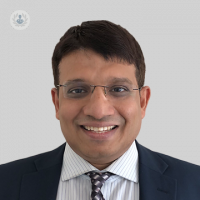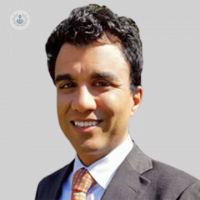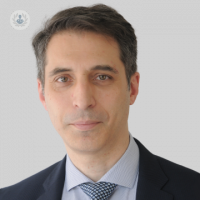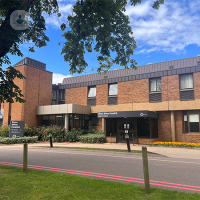What is it?
Lumbalgia, commonly known as low back pain, mainly affects the lower area of your back.
It could be a symptom associated with several different conditions which can in turn arise from several different causes.
There are three main types of lower back pain, based on how long it lasts:
- acute: lasting less than one month;
- subacute: lasting between one and three months;
- chronic: lasting more than 12 weeks.
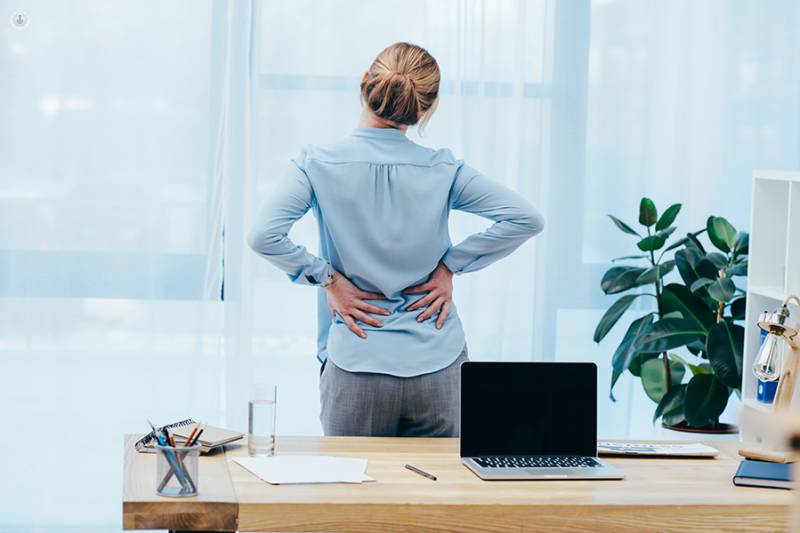
What are the symptoms?
The pain you experience depends on the nature and cause of the back pain, and can extend to:
- your thighs
- the inguinal area and the anterior part of your thigh
- the hips
- the glutes
Based on how severe it is, it can even prevent you from moving or doing everyday activities.
You should seek medical help immediately if you are having difficulties when urinating, or if you feel weakness or numbness in your legs.
How is it diagnosed?
Your GP will look at you and go through your medical history to diagnose what’s causing the back pain.
Following this, it is likely you may need to have further exams including:
- an X-ray of your back
- CT scan
- MRI scan
- blood test
- electromyography
- bone scintigraphy
- myelography
What causes it?
There are several causes for low back pain. The most common causes are small injuries, strains, contractures, sprains or sciatica.
The most common risk factors include smoking, being overweight or obese, a sedentary lifestyle, wearing high-heels shoes, excessively intense or bad form workouts, poor posture, sleeping on an unsuitable mattress, occlusal disorders and cold shock.
Furthermore, women can suffer from more or less severe back pain due to PMS or to the period itself, endometriosis, ovarian cysts, uterine fibroids or pregnancy (especially during the thirdt trimester).
Low back pain can also be a symptom of more severe conditions of your back, such as arthritis, a herniated disc, scoliosis, ankylosing spondylitis, appendicitis or kidney stones.
Finally, many people may have back pain with no clear cause, often referred to as “non-specific back pain”.
How can it be prevented?
You can try to prevent low back pain in the following ways:
- exercising regularly
- improving your posture
- practising relaxation techniques and stress management techniques
- losing the excess weight
- quitting smoking
- learning how to properly lift weights, which can avoid muscle sprains
- sleeping on a good quality mattress.
How is it treated?
Your GP may suggest a few treatments, such as:
- anti-inflammatory painkillers for short-term relief
- physical therapy
- massage therapy
- heat packs (to help loosen stiff muscles) or ice packs (to reduce swelling and inflammation) on the affected areas;
if your herniated disc is causing you a lot of pain, or if you have spinal stenosis, surgery to decompress and stabilise the pain may recommended.
Which doctor should I talk to?
Based on the nature and cause of low back pain, your GP may refer you to one of these medical professionals:
10-19-2015 09-20-2023Low back pain
Dr Elena Nikiphorou - Rheumatology
Created on: 10-19-2015
Updated on: 09-20-2023
Edited by: Kate Forristal
What is it?
Lumbalgia, commonly known as low back pain, mainly affects the lower area of your back.
It could be a symptom associated with several different conditions which can in turn arise from several different causes.
There are three main types of lower back pain, based on how long it lasts:
- acute: lasting less than one month;
- subacute: lasting between one and three months;
- chronic: lasting more than 12 weeks.

What are the symptoms?
The pain you experience depends on the nature and cause of the back pain, and can extend to:
- your thighs
- the inguinal area and the anterior part of your thigh
- the hips
- the glutes
Based on how severe it is, it can even prevent you from moving or doing everyday activities.
You should seek medical help immediately if you are having difficulties when urinating, or if you feel weakness or numbness in your legs.
How is it diagnosed?
Your GP will look at you and go through your medical history to diagnose what’s causing the back pain.
Following this, it is likely you may need to have further exams including:
- an X-ray of your back
- CT scan
- MRI scan
- blood test
- electromyography
- bone scintigraphy
- myelography
What causes it?
There are several causes for low back pain. The most common causes are small injuries, strains, contractures, sprains or sciatica.
The most common risk factors include smoking, being overweight or obese, a sedentary lifestyle, wearing high-heels shoes, excessively intense or bad form workouts, poor posture, sleeping on an unsuitable mattress, occlusal disorders and cold shock.
Furthermore, women can suffer from more or less severe back pain due to PMS or to the period itself, endometriosis, ovarian cysts, uterine fibroids or pregnancy (especially during the thirdt trimester).
Low back pain can also be a symptom of more severe conditions of your back, such as arthritis, a herniated disc, scoliosis, ankylosing spondylitis, appendicitis or kidney stones.
Finally, many people may have back pain with no clear cause, often referred to as “non-specific back pain”.
How can it be prevented?
You can try to prevent low back pain in the following ways:
- exercising regularly
- improving your posture
- practising relaxation techniques and stress management techniques
- losing the excess weight
- quitting smoking
- learning how to properly lift weights, which can avoid muscle sprains
- sleeping on a good quality mattress.
How is it treated?
Your GP may suggest a few treatments, such as:
- anti-inflammatory painkillers for short-term relief
- physical therapy
- massage therapy
- heat packs (to help loosen stiff muscles) or ice packs (to reduce swelling and inflammation) on the affected areas;
if your herniated disc is causing you a lot of pain, or if you have spinal stenosis, surgery to decompress and stabilise the pain may recommended.
Which doctor should I talk to?
Based on the nature and cause of low back pain, your GP may refer you to one of these medical professionals:
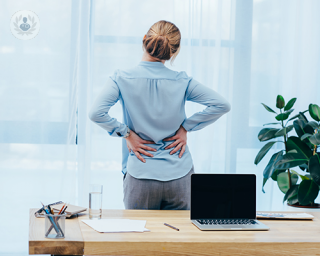

A pain in the back: what is ankylosing spondylitis?
By Professor Robert John Moots
2025-01-20
Back pain is a common problem that many of us will experience in our lives. It can have a variety of causes, from a slipped disc to muscle strain. Ankylosing spondylitis is a chronic (long-term) condition that can cause pain and inflammation and eventually leads to the bones in the spine fusing together. Renowned rheumatologist Professor Robert Moots explains this condition. See more
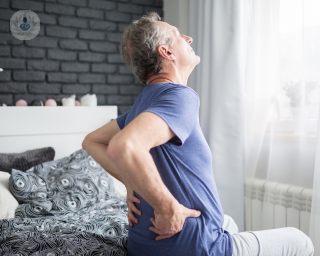

When should I see a doctor for lower back pain?
By Mr Jonathan Bull
2025-01-20
Around 20% of us are expected to visit the doctor this year to treat their lower back pain - a common but very self-limiting condition. Mr Jonathan Bull, neurosurgeon and spinal surgeon based in London, explains what the causes of lower back pain are and how it should be treated. See more


Sports injuries and lower back pain
By Dr John Tanner
2025-01-20
Dr John Tanner explains the importance of seeking a diagnosis for lower back pain and getting professional guidance for treating it. See more
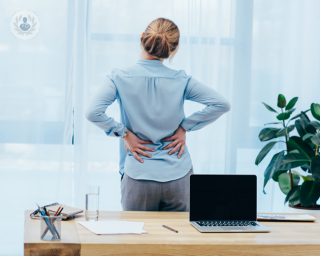

Lumbar spinal stenosis: What can be done?
By Professor Amarjit Anand
2025-01-20
Lumbar spinal stenosis occurs in the lower back, bringing about a variety of troublesome symptoms that can make walking and day-to-day activities painful and difficult. Mr Amarjit Anand walks us through the symptoms, how it's diagnosed and what treatments options are available. See more
Experts in Low back pain
-
Dr Salmin Aseri
Pain medicineExpert in:
- Shoulder pain
- Low back pain
- Neck pain
- Radiofrequency denervation
- Stem cells
- Sports injuries
-
Mr Jaykar Panchmatia
Orthopaedic surgeryExpert in:
- Back pain
- Low back pain
- Sciatica
- Slipped disc
- Spinal osteoarthritis
- Trapped nerve
-
Dr Harjinder Singh
Sports medicineExpert in:
- Joint injections
- Low back pain
- Sports medicine
- Stem cells
- Osteoarthritis
- Sports injuries
-
Dr Udaya Chakka
Pain medicineExpert in:
- Fibromyalgia
- Low back pain
- Knee osteoarthritis
- Lumbar nerve root block
- Epidural infiltration
- Sciatica
-
Mr Panos Liantis
Orthopaedic surgeryExpert in:
- Low back pain
- Neck pain
- Degenerative disc disease
- Spinal cord compression
- Scoliosis
- Minimally invasive spinal surgery
- See all

Pinnacle Global Healthcare
Pinnacle Global Healthcare
13 Lichfield Road
No existe teléfono en el centro.
By using the telephone number provided by TOP DOCTORS, you automatically agree to let us use your phone number for statistical and commercial purposes. For further information, read our Privacy Policy
Top Doctors

Three Shires Hospital - part of Circle Health Group
Three Shires Hospital - part of Circle Health Group
The Avenue, Northampton NN1 5DR
No existe teléfono en el centro.
By using the telephone number provided by TOP DOCTORS, you automatically agree to let us use your phone number for statistical and commercial purposes. For further information, read our Privacy Policy
Top Doctors

Cleveland Clinic London Hospital
Cleveland Clinic London Hospital
33 Grosvenor Place, SW1X 7HY
No existe teléfono en el centro.
By using the telephone number provided by TOP DOCTORS, you automatically agree to let us use your phone number for statistical and commercial purposes. For further information, read our Privacy Policy
Top Doctors
-
Pinnacle Global Healthcare
13 Lichfield Road, StaffordExpert in:
- Orthopaedic surgery
- Diagnostics
- Pain management
- Physiotherapy
- Sports Medicine
- Regenerative Medicine
-
Three Shires Hospital - part of Circle Health Group
The Avenue, Northampton NN1 5DR, NorthamptonExpert in:
- Abdominal ultrasound
- Abdominoplasty
- Acne
- Allergies nose and ears
- Allergy
- Voice disorders
-
Cleveland Clinic London Hospital
33 Grosvenor Place, SW1X 7HY, Central LondonExpert in:
- Cardiology
- Colorectal surgery
- Minimal access surgery (keyhole surgery)
- Gallbladder surgery
- Diagnostic Imaging
- Ultrasound
- Most viewed diseases, medical tests, and treatments
- Trigeminal neuralgia
- Chronic headache
- Ulnar nerve entrapment
- Peripheral nerve block
- Peripheral neuropathy
- Migraine
- Joint pain
- Lumbar herniated disc
- Abdominal pain
- Spinal surgery

